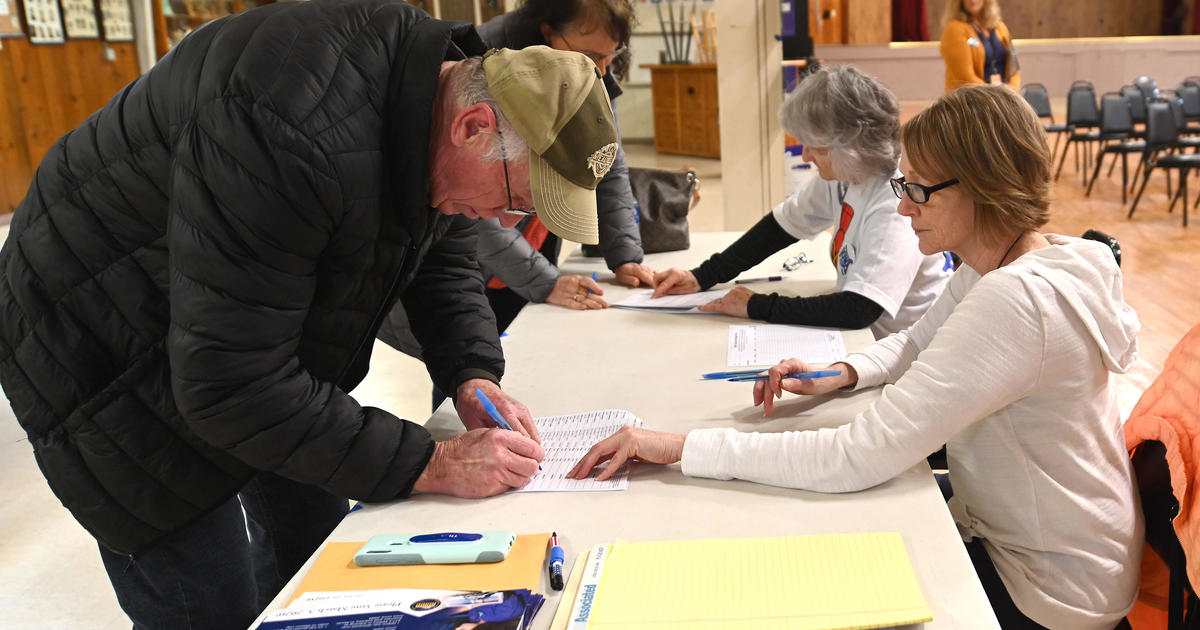
Iowa may have trouble holding onto its status as the first state to weigh in on the Democrats running for president, if a new draft proposal by the leaders of a powerful Democratic Party committee gains support. The proposal, which was circulated Monday, outlines three criteria for selecting up to five states to be part of the party’s early window for nominating a presidential candidate.
The document, which was obtained by CBS News, is labeled “draft – for discussion only.” It says that the Democratic National Committee’s Rules and Bylaws Committee (RBC) will “review and approve a 2024 presidential nominating calendar that (1) reflects the principle that our party’s diversity is its strength; (2) puts Democrats in the best position to win up and down the ballot in November 2024; and (3) contributes to a fair and sound electoral process.”
States that are not selected to be in the early window will not be allowed to hold their nominating contest before the first Tuesday in March or after the second Tuesday in June, unless the RBC explicitly grants an exception. In recent years, only Iowa, New Hampshire, Nevada and South Carolina were permitted to be in the early window. In the past, the Democratic Party has penalized states that have tried to move into the window without the party’s permission.
The draft proposal was first reported by The Washington Post.
Getty Images
The document says that diversity considerations will include factoring in “ethnic, geographic, union representation, economic” and other demographic components. States will also be evaluated by how they contribute to “the party’s ability to win in the general election.” Finally, the RBC will weigh administration factors, including the “feasibility of scheduling a pre-window contest and the ability to run (a) fair, transparent and inclusive nominating process.”
Those criteria are similar to what some RBC members proposed at a meeting earlier in March, where there was discussion about removing Iowa from its spot in the early nominating window. Some Democrats have been critical that Iowa, a state that is 90% White, is the first nominating contest, and say former President Donald Trump’s margin of victory has shown it is not currently competitive in general elections.
Iowa is also required by state law to hold a caucus. The DNC has encouraged states in recent years to ditch caucuses in favor of primaries, arguing that primaries are more accessible to voters.
“Now is not a time for us as a party to stand on tradition, now is not a time for us to stand on status quo,” RBC member Mo Elleithee said at that meeting, after arguing that Democrats should prioritize diversity, competitiveness and states that hold primaries when selecting the early states.
“New Hampshire, Nevada and South Carolina can make a compelling argument on how they fit into that picture,” he added. “I have a harder time seeing it with Iowa, but Iowa should be able to make that case to us. I want to hear how it fits into that framework, that view.”
Scott Brennan, an RBC member from Iowa, defended Iowa’s role in the process at that meeting and said that the four early states in 2020 worked well together to select a nominee who defeated Trump.
The proposal will be discussed at a virtual RBC meeting next Monday, March 28. There aren’t plans to vote on the proposal at that meeting.
“(The proposal’s) transmission to you today is to provide you an opportunity to review and offer commentary, and should not be interpreted as a proposal for voting purposes,” RBC co-chairs James Roosevelt and Lorraine Miller said in an email to RBC members on Monday.
In a statement to CBS News, Roosevelt and Miller said “the RBC is conducting a thorough process over the coming months” to approve any calendar changes.
“We will continue to let the process play out, as it does every four years, and look forward to hearing the insight and recommendations from all interested parties,” Roosevelt and Miller said.
The proposal outlines eventual steps that the RBC will take to consider submissions from states that are hoping to claim a spot in the early window. The draft proposes that there will be at least three virtual public hearings between when the resolution is approved and the deadline for submissions. Eventually, the RBC would invite some of the states that applied to get into the early window to present their case to the committee.
The discussions about changing the calendar ramped up after Iowa’s chaotic 2020 Democratic caucuses, when it took several days to tally results after party officials had problems reporting and calculating results, partly due to glitches in a new app. A review of the caucuses blamed meddling from the DNC, along with missteps from state party leaders, for the problems.
While Democrats are exploring changes to their primary process, the Republican National Committee’s Presidential Nominating Process Committee issued a report earlier this year recommending no substantial changes to the party’s primary calendar. The RNC is expected to adopt those recommendations later this year.
State laws could complicate attempts to overhaul the presidential nominating calendar. New Hampshire’s state law says that the presidential primary will be held on the second Tuesday in March or 7 days before any other state holds a similar election. Nevada’s governor signed a law last year that would make Nevada the first primary state.
“We’re going to be deliberative, we’re going to make sure that we do what’s in the best interest of the party going forward. I’m looking forward to the conversation,” DNC Chair Jaime Harrison told CBS News at the party’s meetings earlier in March. The former South Carolina Democratic party chair added that he wants his state to remain where it is in the primary calendar.
